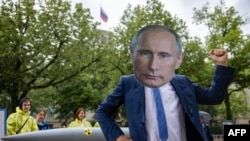LONDON — Most Europeans see Russia as an adversary following its invasion of Ukraine, according to a survey of over 16,000 people across 11 European Union member states.
Europeans tend to have a more favorable opinion of China, with a plurality seeing Beijing as a necessary partner.
Russian ‘adversary’
Two-thirds of Europeans now see Russia as an adversary since its invasion of Ukraine, according to the poll by the European Council on Foreign Relations, or ECFR, which was conducted in April. That’s double the figure from 2021, the last time the survey was taken.
“In particular, majorities in Denmark [74%] Poland [71%], Sweden [70%], the Netherlands [66%], Germany [62%] and Spain [55%], think of Russia as an “adversary” of Europe – while only 37% in Italy and 17% in Bulgaria do,” the ECFR report said.
Future relations
The respondents also were asked about Europe’s future relationship with Moscow.
“Around half of those surveyed [48%] believe their country’s relationship with Russia, in the event of a negotiated peace settlement in Ukraine, should be ‘limited,’” the report said.
“The only country where a majority [51%] of citizens expressed the view that it should be ‘fully cooperative’ was Bulgaria. Many in Austria [36%] and Hungary [32%] also supported this view,” it added.
European Security
The survey looked at attitudes toward the security guarantees provided by the United States and whether Europe should invest more in its own defense. Some EU leaders – notably French President Emmanuel Macron – have called for Europe to develop strategic autonomy, the ability to defend itself independent of the U.S.
Almost three-quarters of the respondents said Europe cannot always rely on the U.S. for its security.
“You can interpret it, of course, as a sign that Europeans are not trusting Americans that much as they used to historically. And in this sense, perhaps the presidency of Donald Trump has left lasting damage to that relationship,” said Pawel Zerka, a co-author of the report with the European Council on Foreign Relations, in an interview with VOA.
“But you can also have a more benevolent interpretation, according to which - simply due to the war in Ukraine and Russia's invasion on Ukraine – Europeans are more ready right now to take responsibility for their security,” he said.
China’s position
The survey asked similar questions about European attitudes toward China.
“A plurality of respondents [43%] consider China a “necessary partner” of their country. This position puts them closer to the political positions of Germany’s Olaf Scholz and France’s Emmanuel Macron than China hawks, such as [European Union Commission President] Ursula von der Leyen,” the report said.
Co-author Pawel Zerka said that compared to Russia, there are marked differences in European attitudes toward China.
“People mostly say that the risks and benefits are balanced, so they do not recognize that economic relationship with China as particularly risky and therefore requiring some rebalancing,” he told VOA.
However, a majority of Europeans opposed the idea of Chinese ownership of key infrastructure, while 41% of respondents said that if Beijing gave weapons to Russia, the EU should impose sanctions on Beijing even if that would harm Western economies.




